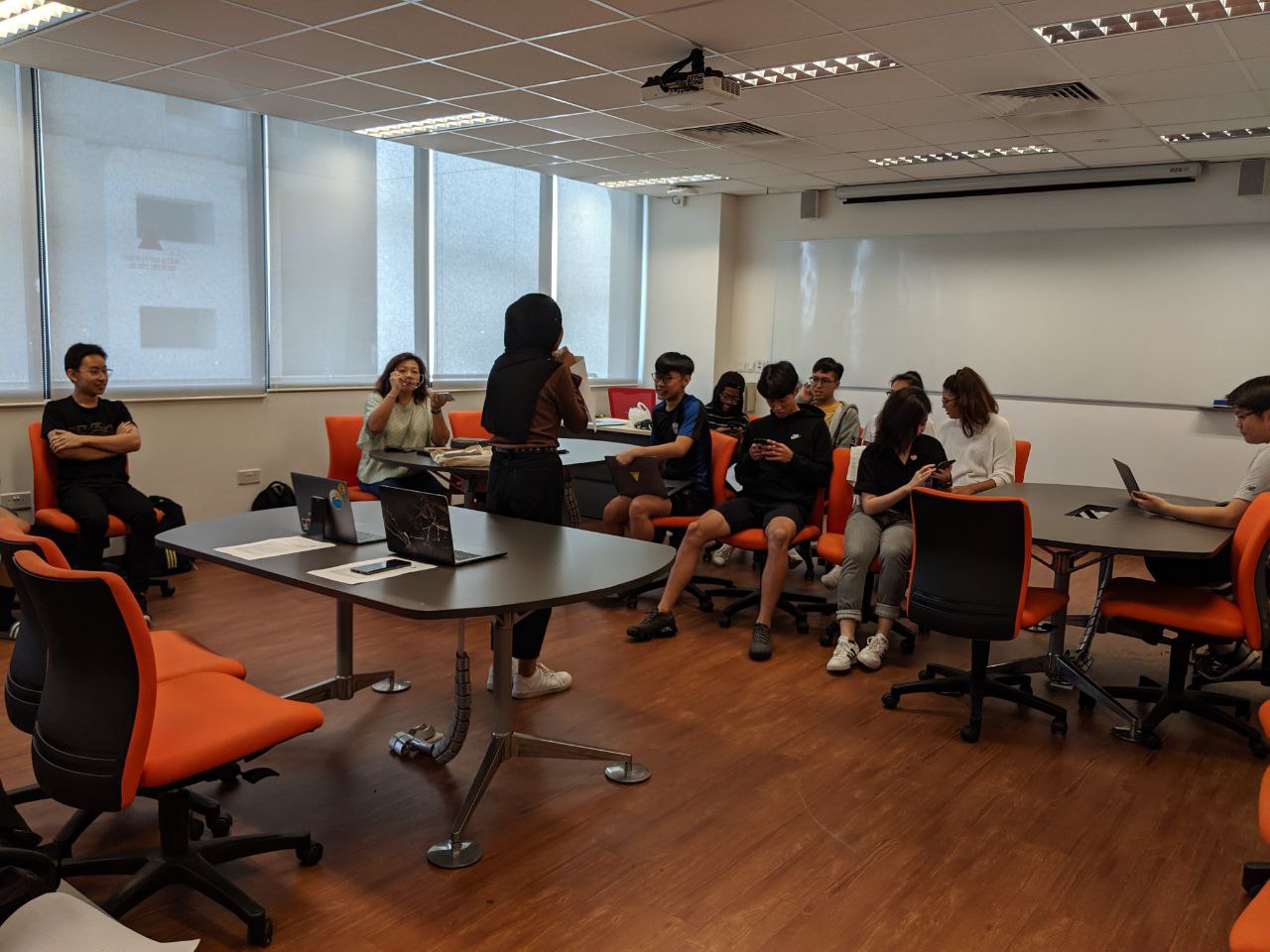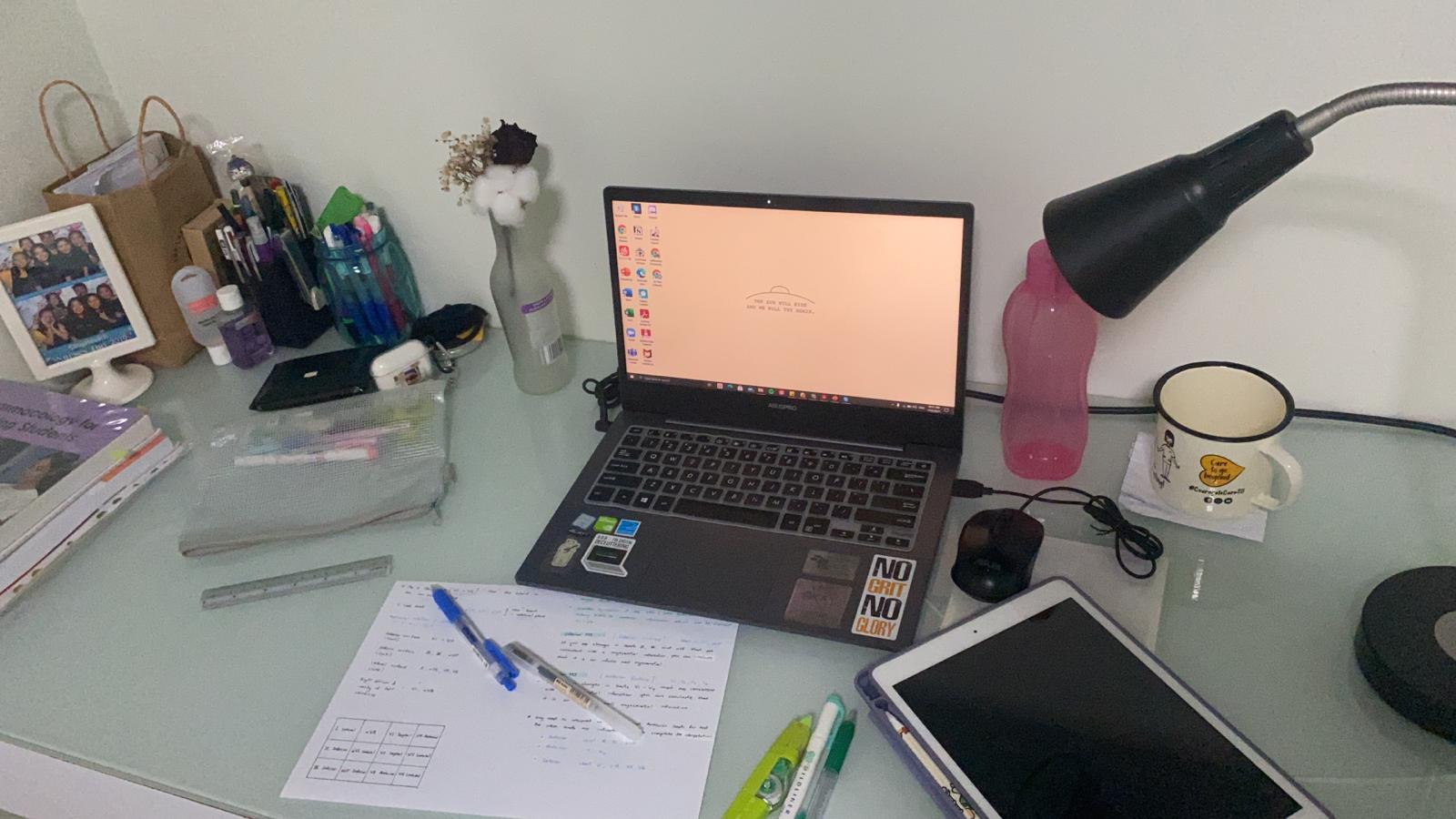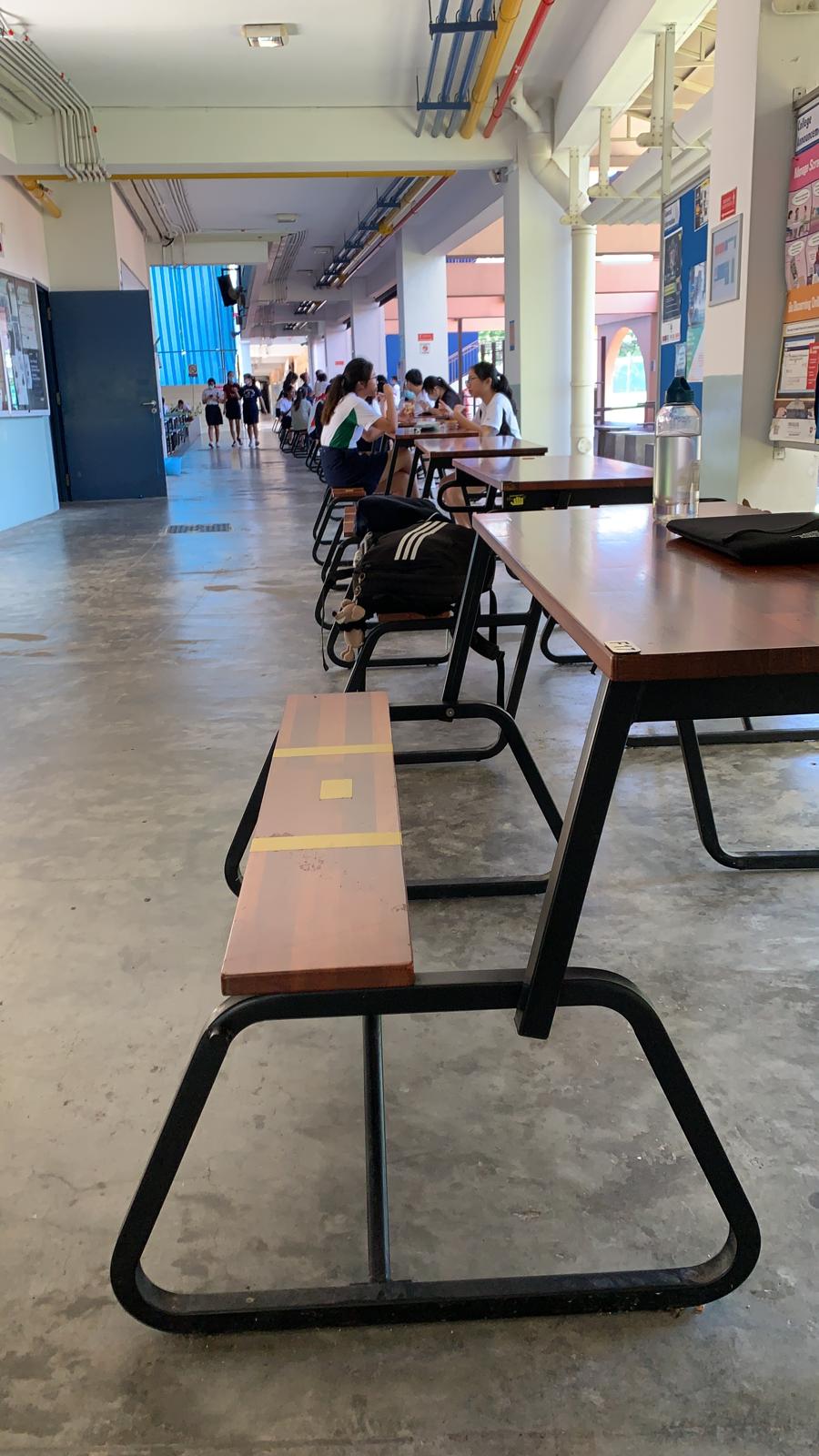Home-based VS On-campus: The New Way of LearningA Bloody Fantasy tale of Revenge
Jamie Mah explores how students and teachers feel about learning from home versus learning on campus, and how a new hybrid learning method appeals to them.
Mass Communication students having a mock PR conference in their lesson before the pandemic. Photo by Adiel Rusyaidi.
BY
Jamie Mah
Editor
Hype Issue #53
Published on
Aug 4, 2021
Home-based learning (HBL) used to be a luxury: Students got to experience a day of what used to be known as ‘e-learning’ at least once a year. Whether or not they enjoyed the opportunity to experience learning from home, students all around Singapore were left with no choice but to adapt to it when the pandemic hit the country.

Mass Communication students having a mock PR conference in their lesson before the pandemic. Photo by Adiel Rusyaidi.
Covid-19 turned the world upside down and left everyone reminiscing about their pre-pandemic life. People of all ages had to adapt very quickly to working or studying from home, and moved their work and personal lives to be confined within their homes.
Taking Ngee Ann Polytechnic as an example, during the circuit breaker, students experienced a 100 per cent HBL lifestyle. Lessons were either pre-recorded for asynchronous lessons or live for students to join and ask questions. Teachers also made themselves available on different platforms for students to ask their questions.
Blackboard, which is the student portal for students, became one of the main modes of submitting assignments, and lessons also took place on this platform. Microsoft Teams and Zoom were utilised for lessons to be delivered on, and Google Classroom was also used for submission of assignments.
Unfortunately, practical lessons had to be postponed until students could return to campus or they were transferred to simple online demonstrations via YouTube videos.
Students adapted from classroom rote learning to digital learning full-time, but was this really beneficial to students in terms of their academics and how much they were able to learn?
Students
Being a student in 2021 means that they are, without a doubt, a digital native. The difficulty of HBL for them was not about figuring out how to use their computer for lessons, but rather, how well they managed to learn from their homes.
There are many things to consider when looking at students doing home-based learning. For example, not everyone has the luxury of having their own room or study table at home and some might not have their own device to be able to access online lessons from. Others might also lack a conducive learning environment at home.

Studying from home during the Circuit Breaker meant that Su Wen missed several lab and clinical classes. Photo courtesy of Tan Su Wen.
“HBL opens up the opportunity for asynchronous lectures, where I can decide when I want to do lectures,” says Willett Liam Michael, 18, a Year 2 Mass Communication student from Ngee Ann Polytechnic. “[This] opens up a lot of new possibilities [for] the way I learn by [allowing me to manage my] time better.”
This also gave students the chance to review their work when needed, allowing them to better understand the material.
“I could revisit whenever I’m unsure of the contents discussed,” agrees Tan Su Wen, 19, a nursing student from Ngee Ann Polytechnic.

Students making the most of HBL by using the features provided by Microsoft Teams. Photo courtesy of Muhammad Idris Bin Mohammad Asrin.
Despite these benefits of HBL, the positives of learning on campus cannot be denied.
“[It] gives me a sense of belonging and duty as a student because I strongly believe that school is a second home,” says Su Wen.
Schools provide students with the most conducive environments for learning. There are less distractions and the amenities provided aided students in their work. Undoubtedly, the lack of social interactions was one of the hardest things for students to adapt to during the year of HBL.

A common study area for students in St Andrew’s Junior College. Photo courtesy of Nur Husna.
“We can interact with friends, study in between classes and just don’t feel so alone in our studies,” explains Nur Husna Faqihah Binte Mohammad Rafiz, 19, a recent St Andrew’s Junior College graduate.
Most students would agree that the largest drawback of learning on campus was the early morning lessons and long travelling hours.
Liam points out that students have to “sacrifice sleeping time, [making them] less alert and ready for lessons early in the morning.”
Conversely, the drawbacks of HBL are that students find it difficult to concentrate at home and it is harder to communicate effectively with classmates.
“Expressing an idea is much harder [through HBL] because the mode of communication lacks the quality to be able to ‘bounce off ideas,’ ” says Husna.
Teachers
Unlike their students, many teachers are not tech-savvy and require some time to get used to using their computers to teach online. This takes time from both the teacher and the students’ schedules and causes frustration on both ends.
“I feel most of my teachers took at least a week to adapt to teaching online,” says Husna. “This hindered our learning because it was not as smooth or seamless as it used to be,” she continues.
When moving to HBL, teachers were faced with the difficult task of migrating face-to-face tasks to the digital screen.
“That was the big challenge, because now how do you engage your students online,” says Ms Illydea Ishak, a lecturer at Ngee Ann Polytechnic’s School of Film and Media Studies.
HBL “was mostly self directed learning”, and teachers needed to find new methods of making lessons entertaining and engaging students.
Hybrid
Having experienced both, students and teachers have mixed feelings about HBL and campus learning. As of late, Singapore seems to have taken a more blended approach for its students, meaning that students experience a form of hybrid learning, with some lessons taking place through HBL and some being on campus.

Mass Communication students celebrating being allowed back on campus for lessons. Photo by Charlotte Chang.
“The main benefit of hybrid learning is balancing the pros and cons of both types of learning which makes learning more efficient and enjoyable,” says Liam.
With some classes being possible from home, the flexibility of hybrid learning makes the most sense whilst still in the midst of a pandemic. However, whether or not it will remain in place after Covid-19 has become a thing of the past is another issue altogether.
“In order for this to be effective, and if it goes on to be a more permanent arrangement, the planning needs to be done carefully,” says Ms Illydea.
Each student has their own preferred method of learning, whether it be through the screen or face-to-face. Students and teachers will have to adapt to learning and teaching through both methods for the foreseeable future.
Both methods have their positives and negatives, but only time will tell how education will continue to take place in Singapore.
12 Comments
Trackbacks/Pingbacks
- สล็อต Gem Saviour - ... [Trackback] [...] Find More to that Topic: hypesingapore.com/index.php/2021/08/04/home-based-vs-on-campus-the-new-way-of-learning/ [...]
- กฎกติกา การแทงบอลเต็ง ที่นักพนันควรรู้ - ... [Trackback] [...] Read More Info here to that Topic: hypesingapore.com/index.php/2021/08/04/home-based-vs-on-campus-the-new-way-of-learning/ [...]
- รวมข้อดีของ สล็อตทุนน้อยแตกง่ายล่าสุด - ... [Trackback] [...] Find More on on that Topic: hypesingapore.com/index.php/2021/08/04/home-based-vs-on-campus-the-new-way-of-learning/ [...]
- cam tokens - ... [Trackback] [...] Find More on on that Topic: hypesingapore.com/index.php/2021/08/04/home-based-vs-on-campus-the-new-way-of-learning/ [...]
- thai massage in Hamburg - ... [Trackback] [...] Read More on that Topic: hypesingapore.com/index.php/2021/08/04/home-based-vs-on-campus-the-new-way-of-learning/ [...]
- รับซื้อกระเป๋าแบรนด์ - ... [Trackback] [...] Information to that Topic: hypesingapore.com/index.php/2021/08/04/home-based-vs-on-campus-the-new-way-of-learning/ [...]
- dtr car detailing - ... [Trackback] [...] Find More to that Topic: hypesingapore.com/index.php/2021/08/04/home-based-vs-on-campus-the-new-way-of-learning/ [...]
- altogel - ... [Trackback] [...] Read More on that Topic: hypesingapore.com/index.php/2021/08/04/home-based-vs-on-campus-the-new-way-of-learning/ [...]
- ปั่นสล็อตเว็บนอกฟรี - ... [Trackback] [...] Info to that Topic: hypesingapore.com/index.php/2021/08/04/home-based-vs-on-campus-the-new-way-of-learning/ [...]
- wonka mushroom chocolate bars - ... [Trackback] [...] Info to that Topic: hypesingapore.com/index.php/2021/08/04/home-based-vs-on-campus-the-new-way-of-learning/ [...]
- Gifts - ... [Trackback] [...] Find More on that Topic: hypesingapore.com/index.php/2021/08/04/home-based-vs-on-campus-the-new-way-of-learning/ [...]
- ทดลองเล่นสล็อต pg - ... [Trackback] [...] Read More on to that Topic: hypesingapore.com/index.php/2021/08/04/home-based-vs-on-campus-the-new-way-of-learning/ [...]
- nổ 789 - ... [Trackback] [...] Find More here to that Topic: hypesingapore.com/index.php/2021/08/04/home-based-vs-on-campus-the-new-way-of-learning/ [...]
- my diery - ... [Trackback] [...] Information on that Topic: hypesingapore.com/index.php/2021/08/04/home-based-vs-on-campus-the-new-way-of-learning/ [...]
- kc9 - ... [Trackback] [...] There you will find 8945 additional Information to that Topic: hypesingapore.com/index.php/2021/08/04/home-based-vs-on-campus-the-new-way-of-learning/ [...]
- โคมโรงงาน - ... [Trackback] [...] Read More on on that Topic: hypesingapore.com/index.php/2021/08/04/home-based-vs-on-campus-the-new-way-of-learning/ [...]
- about me - ... [Trackback] [...] Read More on on that Topic: hypesingapore.com/index.php/2021/08/04/home-based-vs-on-campus-the-new-way-of-learning/ [...]
- ขอขึ้นทะเบียน อย - ... [Trackback] [...] Here you can find 50143 additional Information to that Topic: hypesingapore.com/index.php/2021/08/04/home-based-vs-on-campus-the-new-way-of-learning/ [...]
- Ziyaret et - ... [Trackback] [...] There you will find 33047 more Information to that Topic: hypesingapore.com/index.php/2021/08/04/home-based-vs-on-campus-the-new-way-of-learning/ [...]
- ทีเด็ดบอลเต็ง คืออะไร - ... [Trackback] [...] Read More to that Topic: hypesingapore.com/index.php/2021/08/04/home-based-vs-on-campus-the-new-way-of-learning/ [...]
- George - ... [Trackback] [...] There you can find 57971 additional Info on that Topic: hypesingapore.com/index.php/2021/08/04/home-based-vs-on-campus-the-new-way-of-learning/ [...]
- Chicken Road - ... [Trackback] [...] Read More on on that Topic: hypesingapore.com/index.php/2021/08/04/home-based-vs-on-campus-the-new-way-of-learning/ [...]
- เว็บสล็อตเว็บตรง - ... [Trackback] [...] There you can find 41796 additional Information to that Topic: hypesingapore.com/index.php/2021/08/04/home-based-vs-on-campus-the-new-way-of-learning/ [...]
- rich89bet - ... [Trackback] [...] Here you will find 63853 additional Info to that Topic: hypesingapore.com/index.php/2021/08/04/home-based-vs-on-campus-the-new-way-of-learning/ [...]
- fast-paced crash game - ... [Trackback] [...] Read More Information here on that Topic: hypesingapore.com/index.php/2021/08/04/home-based-vs-on-campus-the-new-way-of-learning/ [...]
- ออกแบบโรงแรม - ... [Trackback] [...] Read More on on that Topic: hypesingapore.com/index.php/2021/08/04/home-based-vs-on-campus-the-new-way-of-learning/ [...]
- ufabet789 - ... [Trackback] [...] Information on that Topic: hypesingapore.com/index.php/2021/08/04/home-based-vs-on-campus-the-new-way-of-learning/ [...]
- Prayerbook - ... [Trackback] [...] Read More on that Topic: hypesingapore.com/index.php/2021/08/04/home-based-vs-on-campus-the-new-way-of-learning/ [...]
- online site - ... [Trackback] [...] There you can find 95264 additional Info on that Topic: hypesingapore.com/index.php/2021/08/04/home-based-vs-on-campus-the-new-way-of-learning/ [...]
- หวยนาคา - ... [Trackback] [...] Read More on to that Topic: hypesingapore.com/index.php/2021/08/04/home-based-vs-on-campus-the-new-way-of-learning/ [...]
- ufabet789 - ... [Trackback] [...] There you can find 60402 additional Information on that Topic: hypesingapore.com/index.php/2021/08/04/home-based-vs-on-campus-the-new-way-of-learning/ [...]
- 1xslots - ... [Trackback] [...] There you will find 42310 more Information on that Topic: hypesingapore.com/index.php/2021/08/04/home-based-vs-on-campus-the-new-way-of-learning/ [...]

The point of view of your article has taught me a lot, and I already know how to improve the paper on gate.oi, thank you. https://www.gate.io/tr/signup/XwNAU
I don’t think the title of your article matches the content lol. Just kidding, mainly because I had some doubts after reading the article. https://accounts.binance.com/ar/register?ref=IQY5TET4
Your point of view caught my eye and was very interesting. Thanks. I have a question for you.
FixNGoTX is your trusted local expert for all garage door repair needs in Texas. Whether it’s a broken spring, malfunctioning opener, or an off-track door, our skilled technicians provide fast, reliable service to get your garage door working smoothly again. We pride ourselves on quality workmanship, transparent pricing, and exceptional customer care. With FixNGoTX, you can expect same-day service, 24/7 emergency repairs, and a commitment to your complete satisfaction. Keep your garage door in top shape with FixNGoTX—your dependable partner in garage door solutions.
Your article helped me a lot, is there any more related content? Thanks!
I don’t think the title of your article matches the content lol. Just kidding, mainly because I had some doubts after reading the article.
Thank you for your sharing. I am worried that I lack creative ideas. It is your article that makes me full of hope. Thank you. But, I have a question, can you help me? https://www.binance.com/bg/join?ref=V2H9AFPY
Your article helped me a lot, is there any more related content? Thanks! https://accounts.binance.info/en-IN/register?ref=UM6SMJM3
Can you be more specific about the content of your article? After reading it, I still have some doubts. Hope you can help me.
Thanks for sharing. I read many of your blog posts, cool, your blog is very good.
The information provided by you can be very useful for me!
For anyone looking for more ways to improve IG Reels visibility, this short guide might help — Followers buy India
I tried the Astronaut-themed flight game lately and it totally hooked my attention, link https://crushtop.org . The idea feels straightforward: a rocket flies forward while a multiplier grows, and I have to stop before the crash. Larger danger equals larger profit, and control feels everything.
Initially I bet small, just so I could understand this game, but in some bets I already realized a rhythm. The excitement is insane each second, especially as the number starts going up. The interface is minimalistic, nothing important interrupts, and the whole game loads perfectly.
I tested on my phone and the game worked without issues. Payments felt fast, which is important personally. I personally did not see anything strange during play. Overall, the Astronaut crash game feels addictive. If someone like quick multiplier games, it feels like worth checking out.
Just remember: play with control.